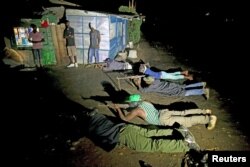Many families in Burundi’s capital have moved across town for fear of being caught in clashes between armed youth and security forces, as the political violence there enters its eighth month. Those who have fled, however, say life is no easier.
Twenty-five-year-old Hirakoze Johari and her two children are one of just a few hundred families left in the Cibitoke neighborhood in central Bujumbura.
“Life is bad here," she said, "we are struggling, there is so much violence, so much gunfire."
She said people cannot go to work, and they remain in their homes if they have not fled. She said her situation did not allow her to escape.
Cibitoke opposition
Cibitoke neighborhood is seen as a stronghold of the opposition. The neighborhood is one of the areas worst hit by violence since people took to the streets in April demanding President Pierre Nkurunziza not run for a third term in office. In July, Nkurunziza won re-election and the violence has continued.
The United Nations says at least 240 people have been killed since April.
Since August, the violence has spread to previously untouched areas of the capital, like Mutakura and Ngagara.
Ndashimiya Shura fled to what she thought would be a safer neighborhood in early November. She was wrong.
“We cannot sleep. We cannot afford food. We are sleeping 16 people in a one-bedroom house," she said.
She said it is crowded, unhealthy and unsafe. She added she hears gunfire and see "people running and you do not know why they are running.”
Displaced persons
There are no reliable statistics on how many people are displaced within Burundi. The United Nations says nearly 200,000 people have fled into neighboring countries.
And the violence appears to have evolved. Security forces and government-allied militias have been accused for months of arresting and killing perceived opposition supporters. But the past few weeks have seen an increase in attacks on government targets, including armed vigilantes clashing with police on patrol.
The clashes often happen at night.
Burundi’s Red Cross spokesman Alex Manirakiza said it is dangerous for aid workers to respond at night.
“We have put in place what we call hotline. People can call us [at night]. We record their calls and in the morning we call them back, and they tell us where they are. If they are injured, we take them to the hospital,” he said.
U.N. Secretary-General Ban Ki-moon has said he is prepared to send peacekeepers to Burundi to quell the political violence, but only if other options fail. One of the options described by the U.N. chief was the creation of a political mission to monitor human rights and support political dialogue to end the months of violence.
